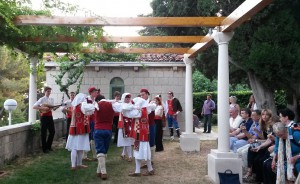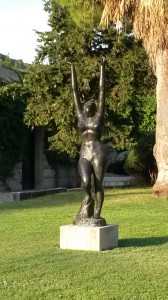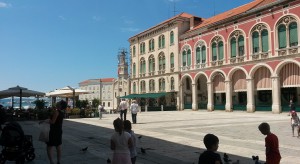I recently attended the 12th European Association of Science Editors (EASE) Conference in Split, Croatia. The meeting was based at the University of Split School of Medicine and included a reception in the beautiful Mestrovic Gallery and a dinner with delightful Croatian dishes to try, all of which provided a relaxing setting to meet conference delegates. The atmosphere was friendly and informal, and on each day a newsletter “Split Infinitive” was issued with news and gossip about the conference events.

At the conference I gave a presentation on “How can a Publisher support its Editors? A perspective from BioMed Central”. At BioMed Central we try to support our Editors in ways that suit them (every Editor is different!), both by providing ‘nuts & bolts’ guidelines by email and access to online resources. These include a Code of Conduct (explaining what we expect of Editors and what they can expect of us) and our Editorial Policies. We also facilitate personal contacts between in-house Editors, Publishers and the Biology and Medical Editors. This year we have been working hard on a new online distance learning course for BioMed Central Editors to provide further support. The amount of assistance we offer was appreciated by the editors present at the session, especially in the light of the survey presented by Pippa Smart. She queried editors and publishers on their views relating to the ‘quality’ and ‘usefulness’ of resources provided for editors by publishers. She found that publishers provide broadly what editors want, but there is a real need voiced by editors for networking and information sharing. In general it appears that publishers give Editors-in-Chief less support than they think they do, and it seems that more support goes to Managing Editors.

Despite having ‘European’ in its name, EASE is a very international organization whose members come from more than 50 countries all over the world. Reference to ‘Science Editors’ in the acryonym also does not quite cover it as members include not only editors in various roles, but also publishers, academics, translators, science and technical writers, corporate communicators, technical illustrators, proofreaders and production personnel. This variety of backgrounds was reflected in the wide spread of topics covered by the Conference – for the list of sessions and abstracts see here. The conference also included a poster session and a number of additional workshops. There was quite a lot of twitter activity (#EASE2014), nicely summarized in a storify by Duncan Nicholas (@dvlpmntduncs).
A personal highlight for me was the plenary lecture from Liz Wager, a former Chair of COPE (the Committee on Publication Ethics) and one of the Conference organizers. Her talk about “Research into peer review: how could peer-reviewed publications be more efficient?” was illustrated with images of dogs to show how peer review may turn into a beauty pageant or a grooming service. Liz discussed how peer review is not very effective at detecting errors or fraud, and how difficult it is to assess if it is actually a good filter of content for readers. Liz also mentioned the Cochrane systematics reviews she co-authored on “Effects of Technical Editing in Biomedical Journals” and “Effects of Editorial Peer Review” . These showed no effect of reviewer or author concealment (blind peer review) on the quality of review and rather alarmingly found that copyediting did more to improve articles than peer review. Liz felt that publications could be further improved if they had better linking of articles and underlying data, threaded publications, translations and plain language summaries. At BioMed Central we have gone some way to address these issues with the GigaScience Database, our involvement with CrossRef, and lay summaries in journals such as Cell Communication and Signaling or Canine Genetics and Epidemiology.

Apart from plenary lectures, the conference also featured shorter presentations organized into parallel sessions. Irene Hames (COPE council member until the end of 2013) and Andre van Steirteghem (COPE co-secretary) ran a publication ethics workshop organized in a similar way to a COPE forum. The participants discussed several COPE cases in small groups. I found it particularly useful to learn what other editors would do in tricky situations and what advice was given by COPE. Irene also presented the new taxonomy of COPE cases and showed how cases have become more complex over time. Andre gave an update on COPE’s latest initiatives and revealed that there is work in progress for how COPE deal with members who do not adhere to COPE guidelines. So far COPE has never banned a member and always focused on educating and not punishing.
The next EASE meeting is planned for June 2016 in Strasbourg, focusing on “Scientific integrity: editors on the front line”. I came away from this meeting with the impression that EASE is a friendly organization that is very helpful to editors and authors alike. Although with its broadening membership involving countires outside Europe and striving to become more worldwide, this might lead to a rather unfortunate acronym change to ‘WASE’. Hmmm.
Comments